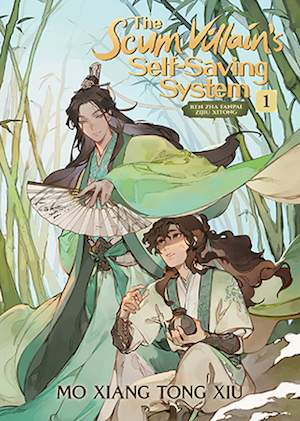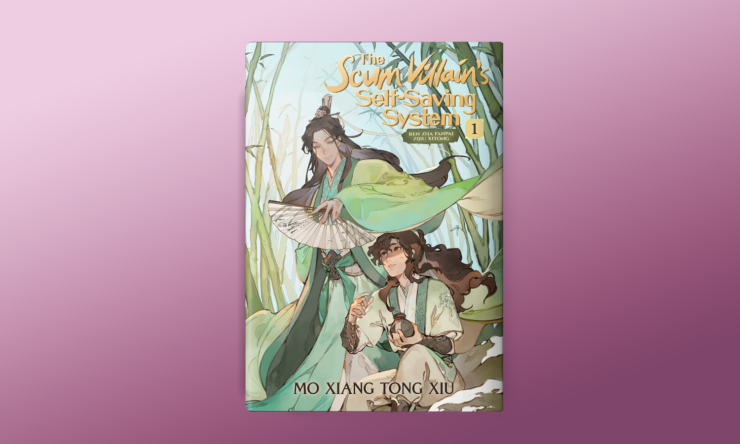For months, one of my pals has been muttering “god I can’t wait until you meet Shen Yuan” during all our book conversations. Before the translations were announced, even! I think it haunted him, knowing what awaited me but being unable to bring the textual encounter to fruition. The enthusiasm was contagious, though, and once I’d snagged my copies no force on earth could stop me from reading Scum Villain (人渣反派自救系统 / Rén Zhā Fǎnpài Zìjiù Xìtǒng) first.
The general premise goes something like, “the loudest anti-fan of trashy stallion webnovel dies in the midst of an impassioned critique rant and transmigrates as the cruel, untouchable teacher of the handsome protagonist—a protagonist whomst he, like, adores? Except his efforts to craft a ‘magnificent, high-quality, first-rate classic’ from the OG novel (and coincidentally, save his own skin)… ahem, change the story more than he anticipated.” By which I mean: things get gay.
While the transmigration setting of Scum Villain might start off as a het-porn cultivation novel, the central theme nonetheless ends up being, “compulsory heterosexuality is a hell of a drug, look at Shen Yuan go.” I couldn’t have asked for better metafictional catnip to be crafted, personally, for me. Because on one level, as an avid critic dumped into a novel, Shen Yuan is brilliant! He’s spent hours upon hours bitching about the book online; he remembers every detail of the monsters and plot elements. He has a finely-tuned sense of tropes and how he needs to change the story if he wants to rescue himself from a fate worse than death… but he’s also operating on ten simultaneous tiers of brain-bending heteronormative repression at once and no one is actually as straight as he assumes, himself included.
From the start it’s impossible to miss how he describes all the other men in the novel in terms of their beauty, their poise, their muscles and waistlines—while describing women based on their battle skillsets or wardrobes, plus how he wishes the OG author had let them think more. And though he adores the cute, fluffy student version of protagonist Luo Binghe to an overwhelming degree, he simply cannot grasp that his disciple is nursing the fattest crush on him. Nor why the “wife-plots” seem to be all directing towards him instead of the girls. Nor, like, anything at all regarding his relationships with Liu Qingge and Yue Qingyuan.
Buy the Book


The Scum Villain’s Self-Saving System
Mo Xiang Tong Xiu is so very good at unreliable narrators and layering implications or misdirection in scenes to craft tension, critique, or humor. Given how much Shen Yuan is incapable of acknowledging about himself in contrast to what the text (or even his own loud-ass internal monologue) reveals about him, he’s the perfect sort of protagonist for this sort of book. I’m desperately fond of him, and he’s such a dumbass. When Shang Qinghua-slash-Airplane later observes, “It’s only, long ago, I began to suspect that Cucumber-bro [Shen Yuan] was a faithful reader, just one who didn’t like expressing his feelings in a normal way,” he’s made an accurate assessment. (God, but their whole vibe together makes me laugh uproariously: the two normal [??] guys stuffed through reality into their life-altering internet novel obsession.)
And also on that note: Scum Villain is, seriously, fucking hilarious. The translation from Faelicy & Lily maintains the terminal online-ness of Shen Yuan’s narration; the contradictions between what our protagonist believes he’s feeling and doing versus what the narrative or other characters observe him feeling and doing; and the dryly mechanical sarcasm-slash-pettiness of the System’s prompts, which genuinely made me cackle. I enjoyed their approach to the translation immensely. For example, our first engagement with the System, when Shen Yuan kicks the bucket in his original body, begins with its annoyance that he’s been railing against the book as if he could do better—
[Activation code: “Dumbfuck author, dumbfuck novel.” System automatically triggered.]
The tone reminded him of Google Translate.
—before it proceeds to regularly terrorize him with arbitrary-seeming game point values, judgmental emoji, threats of death, and arguments about OOC actions. It’s doubly hysterical to me that Shang Qinghua, actual author of the OG novel, has similarly been transmigrated and saddled with the System for his sins against serial fiction. (Sympathies from one creator to another, buddy.) Multiple tiers of meta run over and through one another concurrently in these books, but the System is definitely one of the funniest.
However, as will be a reoccurring theme in these MXTX essays, there’s more to Scum Villain than its screwball comedic energies. As the novel (ours and the OG) approaches its first climactic event—the moment of betrayal wherein Shen Qingqiu tosses Luo Binghe down into the Endless Abyss—the reader begins to see Shen Yuan’s struggle with his understanding of these people as fictional characters versus his experiences of them as real, feeling individuals with whom he has relationships. When he fails to avoid or change this event from the novel, having thrown his trusting disciple into the demonic Abyss, his guilt and mourning are all scrambled together. While his colleagues and other disciples see his grief, he denies himself the right to his feelings of loss, because he sees the whole situation as his own fault.
And though he’s of course aware Luo Binghe hasn’t died as everyone else believes, he’s mourning a loss all the same: the metaphorical death of the sweetly affectionate boy he’s sure Binghe will no longer be upon his triumphant return later in the “plot.” The illustrations by Xiao Tong Kong throughout the novel are all top notch, but their rendering of the final moments at the edge of the Abyss, with Shen Qingqiu’s sword tip lodged in Luo Binghe’s chest and the young disciple’s eyes wide, tearful, shocked—that one’s powerful. There’s a sense of graceful movement and emotionality across the illustrations that encompasses the silliness, seriousness, and handsomeness of these characters; it’s a perfect fit for the series as a whole.
Overall, with the first volume down and three to go, Scum Villain has me howling for more. The novel is a shameless, self-aware romp tailored for fandom nerds—but most especially those of us weak to a guy whose sexual repression has come so full-circle that he’s sure it’s straight to regularly reflect with impressed pleasure on how huge another man’s dick is. Plus, there’s also the fact that Shen Yuan-as-Shen Qingqiu is changing the world (…to be more gay and emotionally fulfilling) through kindness and consideration for others adding some heart to the sex-farce chaos.
Really, hm, eager to see how that works out for him.
Verdict: Most Laugh-Shouting at the Protagonist
Lee Mandelo (he/they) is a writer, critic, and occasional editor whose fields of interest include speculative and queer fiction–especially where the two coincide. Summer Sons, their spooky gay debut novel, was recently published by Tordotcom, with other stories featuring in magazines like Uncanny and Nightmare. Aside from a brief stint overseas, Lee has spent their life ranging across Kentucky, currently living in Lexington and pursuing a PhD in Gender Studies at the University of Kentucky.










